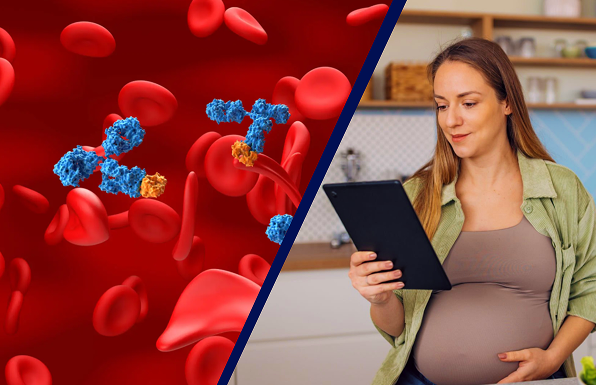Anemia and Pregnancy
Your body goes through significant changes when you become pregnant. The amount of blood in your body increases by about 20% to 30%, which increases the supply of iron and vitamins that the body needs to make hemoglobin. Hemoglobin is the protein in red blood cells that carries oxygen to other cells in the body.
Many women lack a sufficient amount of iron needed for the second and third trimesters. When your body needs more iron than it has available, you can become anemic.
Mild dilutional anemia is normal during pregnancy due to an increase in blood volume. More severe anemia, however, can put your baby at a greater risk for anemia later in infancy. In addition, if you are significantly anemic during your first two trimesters, you are at greater risk for having a preterm delivery or a low birth weight baby. Being anemic also burdens the mother by increasing the risk of blood loss during labor and making it more difficult to fight infections.

Symptoms of Anemia
Many of the symptoms of anemia during pregnancy are also symptoms you may experience even if you are not anemic; these include:
- feeling tired or weak
- progressive paleness of the skin
- rapid heartbeat
- shortness of breath
- trouble concentrating
Doctors typically screen for iron deficiency anemia with complete blood count in first trimester and often in later second trimester to optimize for delivery. Additional iron studies or other evaluations may be needed.
Am I at Risk for Anemia?
You are at greater risk for becoming anemic during your pregnancy if you:
- have two pregnancies close together
- are pregnant with more than one child
- are vomiting frequently due to morning sickness
- do not consume enough iron
- had a heavy pre-pregnancy menstrual flow
Is Pregnancy-Related Anemia Preventable?
Good nutrition is the best way to prevent anemia if you are pregnant or trying to become pregnant. Eating foods high in iron content (such as dark green leafy vegetables, red meat, fortified cereals, eggs, and peanuts) can help ensure that you maintain the supply of iron your body needs to function properly. Your obstetrician will also prescribe vitamins to ensure that you have enough iron and folic acid. Make sure you get at least 27 mg of iron each day. If you do become anemic during your pregnancy, it can usually be treated by taking additional iron supplements.
Ask your doctor about your risk for anemia, and make sure you are tested at your first prenatal visit. You also may want to get tested 4 to 6 weeks after delivery. Depending on your condition, your doctor may refer you to a hematologist, a doctor who specializes in blood conditions.
Where Can I Find More Information?
If you are interested in learning more about blood diseases and disorders, here are a few resources that may be helpful.


